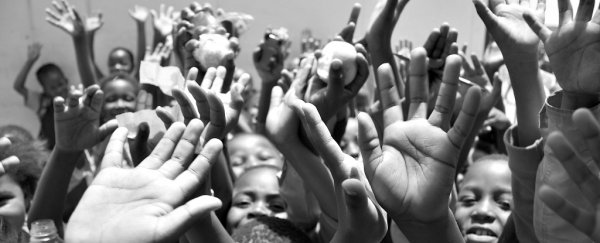A new study has revealed for the first time that a small group of HIV-infected kids have evolved a unique, "primate like" immune system that protects them from developing AIDS.
Normally, without treatment, more than half of all children with HIV worldwide will die before they're two years old, but previous research has shown that up to 10 percent of infected kids will never get symptoms from the infection, making them "paediatric non-progressors" - and now we finally know why.
The new study shows that, similar to non-human primates, the immune systems of these kids don't freak out when they come into contact with HIV, and this keeps the infection from getting out of control.
It's hoped that we can now learn from these children, and use them as a model to develop better HIV treatments in the future.
When someone is infected with HIV, the virus usually hijacks the body's immune system, and gradually wipes out its white blood cell population, leaving the patient vulnerable to all other infections - a state called acquired human immunodeficiency syndrome, or AIDS.
When a patient has AIDS, even a common cold can be fatal, but current antiretroviral treatments allow people to live relatively healthy lives by suppressing HIV before it progresses to this stage.
A new study analysed 170 South African children under the age of five who were paediatric non-progressors - in other words, who have HIV, but have never had AIDS, despite not undergoing antiretroviral therapy. And the results showed that their immune systems had a totally different response to HIV.
These kids had tens of thousands of HIV particles in every millilitre of their blood - something that would usually drive a person's immune system into crazy defensive action against the virus, and make them seriously ill. But neither was happening to these kids.
"Essentially, their immune system is ignoring the virus as far as possible," one of the researchers, Philip Goulder, from the University of Oxford in the UK, told James Gallagher at the BBC. "Waging war against the virus is in most cases the wrong thing to do."
That's because when the immune system goes into overdrive against HIV, even more white blood cells can be killed by chronic inflammation levels, leading to a speedier wipe out of the immune system.
By simply not fighting back, it appears the immune system can bunker down and survive an infection.
Interestingly enough, this is also the strategy taken by 40 species of non-human primates, which are also able to survive an HIV infection by not allowing it to progress to AIDS.
"Natural selection has worked in these cases," said Goulder, "and the mechanism is very similar to the one in these kids that don't progress."
And in humans, the strategy is pretty much unique to kids.
Scientists have spent decades studying the roughly 0.3 percent of adults who are able to handle HIV infection without it progressing - known as 'elite controllers' - but their immune systems do pretty much the opposite of these children.
Instead of 'keeping calm', they mount an increasingly aggressive attack against the HIV virus - something that usually ends up making the infection worse when trialled in other patients.
The team is now continuing to investigate whether the 'do-less' kid approach will work any better for future treatments - and whether or not these children continue to be protected against AIDS even as they age.
"It is not known whether it would be clinically safe for these newly identified HIV infected paediatric non-progressors to remain off-therapy," infectious disease specialists Ann Chahroudi and Guido Silvestri from Emory University in the US, who weren't involved in the study, write in a commentary on the new research.
But they do admit that the study might have found the "very earliest signs of coevolution of HIV in humans".
"We may be identifying an entirely new pathway by studying kids that in the longer term could be translated to new treatments for all HIV infected people," Goulder told the BBC.
We're still a long way away from that, but by better understanding this incredible group of children, we might finally have a better understanding of how to manage HIV with fewer drugs and side effects.
The research has been published in Science Translational Medicine.
